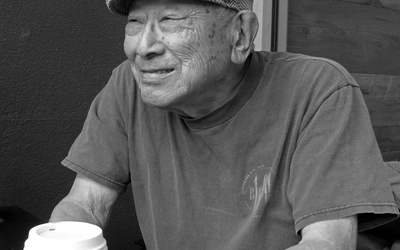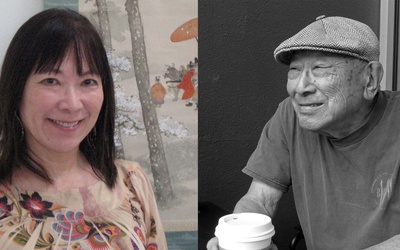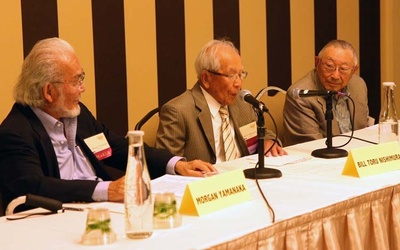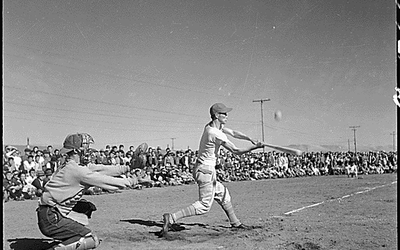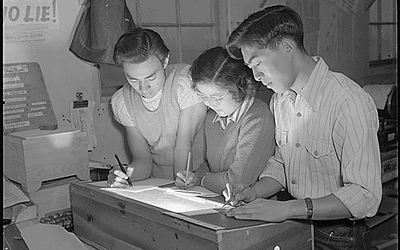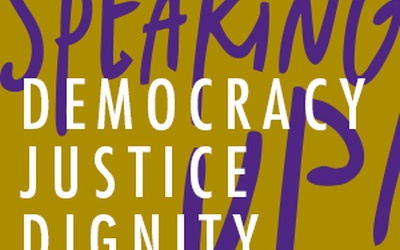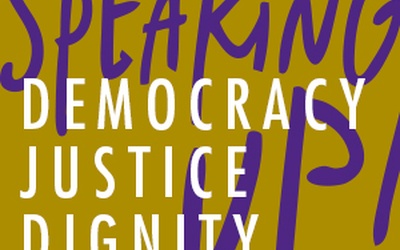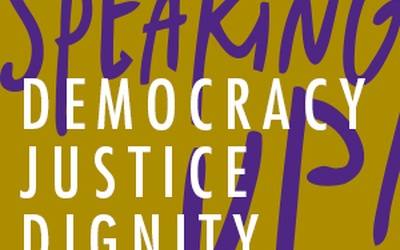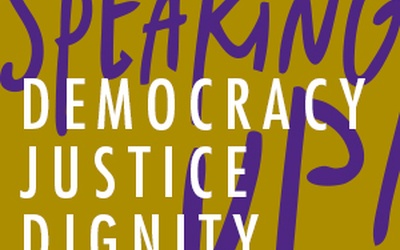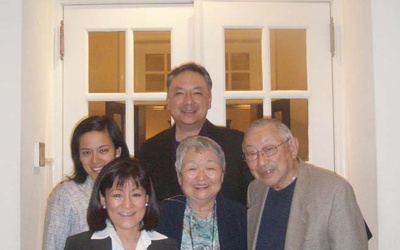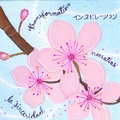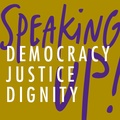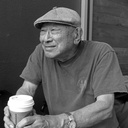
Hiroshi Kashiwagi
Born in Sacramento in 1922, writer and actor Hiroshi Kashiwagi spent his early years in Loomis, California. He was incarcerated at Tule Lake Segregation Center during World War II where he was defined as a “disloyal” for refusing to answer the loyalty questions. He renounced his U.S. citizenship and later worked with the Tule Lake Defense Committee and Wayne M. Collins to restore his citizenship. Since 1975 he has been speaking publicly of his incarceration experience. His poem “A Meeting at Tule Lake,” written while on a pilgrimage in April 1975, established him as a seminal voice among Nikkei concentration camp survivors.
He earned his BA in Oriental Languages from UCLA in 1952, followed by an MLS from UC Berkeley in 1966. Kashiwagi has worked as editor, translator, interpreter, and English language secretary at Buddhist Churches of America Headquarters; he has also served as reference librarian at San Francisco Public Library with a specialty in literature and languages. His publications include Swimming in the American: A Memoir and Selected Writings, winner of American Book Award, 2005; Shoe Box Plays; Ocean Beach: Poems; and Starting from Loomis and Other Stories. Notable acting credits include the play The Wash, produced at the Eureka Theatre in San Francisco, and the films Hito Hata: Raise the Banner (1980, dir. Robert Nakamura), Black Rain (1989, dir. Ridley Scott), Rabbit in the Moon (1999, dir. Emiko Omori), and Infinity and Chashu Ramen (2013, dir. Kerwin Berk).
He passed away in October 2019 at age 96.
Updated December 2019.
(Author photo by Ben Arikawa)
Stories from This Author
In Homage to Hiroshi Kashiwagi
Dec. 19, 2019 • Hiroshi Kashiwagi , traci kato-kiriyama
As we come to our 4th December and third anniversary of Nikkei Uncovered: a poetry column, it seemed very fitting to pay tribute to the recently departed poet, Hiroshi Kashiwagi. A beloved community member and writer for many generations, Hiroshi was the inaugural poet featured (alongside Amy Uyematsu) when we began the column. I have fond memories of hearing Mr. Kashiwagi read his poetry aloud and I was always inspired by his candor, slightly mischievous smile, and of course, his …
Location
Dec. 15, 2016 • Amy Uyematsu , Hiroshi Kashiwagi , traci kato-kiriyama
For the column’s inaugural post, we wanted to begin with the theme of place, location, and community and to highlight two veteran poets—Hiroshi Kashiwagi, Nisei poet based in San Francisco since 1962, and Amy Uyematsu, Sansei poet and native Angeleno. We are excited to begin with two writers who dedicate much of their creative focus and livelihood to poetry and who have had an influence on so many. Cheers to what their poetry uncovers… —traci kato-kiriyama * * * * …
My Opposition to the Registration
Sept. 17, 2013 • Hiroshi Kashiwagi
Background I will begin with a brief background of my life before camp as I feel it has some bearing on my reaction to the loyalty questionnaire or the so-called “Registration” order. My parents being aliens, foreigners, and outsiders, I remember that our life was quite marginalized. For example, my father’s store at the far end of town was always referred to as the “Jap store” by the people in town. Growing up, I constantly heard my father use the term …
Tule Lake - Part 2 of 2
July 16, 2013 • Hiroshi Kashiwagi
Read Part 1 >>I was having the time of my life, working a few hours a day as a dishwasher in the mess hall and devoting the rest of my time to what I loved—acting, reading, writing, and meeting people with similar interests. Camp life was great. But it all came to an abrupt end in February 1943 with the so-called “loyalty registration,” which was a joint order by the Army and the WRA to facilitate the Army in recruiting …
Tule Lake - Part 1 of 2
July 9, 2013 • Hiroshi Kashiwagi
When we arrived at Tule Lake in the morning, we were greeted by a man who claimed to be our Block Manager. It was nice to have someone welcome us on our arrival at this desolate place near the northern border of California. “If you need anything just ask me,” he said. He provided us with mattresses and Army blankets; we unpacked and settled in. After the miserable experience in Arboga, we were excited about the flush toilets in the …
Free Streets
July 1, 2013 • Hiroshi Kashiwagi
It was in March of 1946, the morning after my brother, sister, and I came out of camp. We had been given $25 each and a free ride on the train. The train seemed better than the old milk train with the shade drawn that took us to Tule Lake in 1942. After being held until almost the closing of camp, we were finally released. I guess we were used to being confined, but camp was nearly deserted. We were …
A Trip to Cedarville
June 17, 2013 • Hiroshi Kashiwagi
It was near the closing of camp, when restrictions were being relaxed a bit, that I heard from our neighbor George about Mr. Crane, the Camp Reports Officer, taking a small group to entertain some high school students at Cedarville. Cedarville is in Modoc County, about 120 miles from Tule Lake. George and a few of his musician friends were going and he asked me if I would be interested in joining them. My first thought was “I don’t sing …
Radio Station KOBY in Medford, Oregon
May 30, 2013 • Hiroshi Kashiwagi
Daytime we could get only two radio stations—small town stations in Medford and Klamath Falls, Oregon that played incessantly. the women dug the lakebedand turned up seashellslong dormant in the sandsorted and cleanedpainted and shellackedthey became ornamental thingstrinkets and necklacesmade in captivity this is Radio Station KOBY in Medford, Oregon we took pieces of 2 x 4whittled and carved themmine were unremarkablebut old Yoshimoto-sanalways did womena shelf lined with themsevere and woodboundmore Egyptian than Japaneseall frontal and nude this is …
The Block Manager’s Canary
May 23, 2013 • Hiroshi Kashiwagi
I knew three block managers in camp—actually, four, as I was one myself. Though I don’t consider myself a regular block manager, since I served only a few months toward the end of camp when there was little administrative work. But recently a former resident of my block unnerved me by announcing to one and all, “He was our Block Manager!” I didn’t know how to take that. A block manager was indeed an important functionary in the block. He …
A Visit to The White House
June 18, 2011 • Hiroshi Kashiwagi
It was a windfall event, unexpected and surreal, especially the jaw-dropping reaction of the people. “You mean The White House?” “Yes.” “You’re kidding me?” “No.” And we showed the invitation from The President and Mrs. Obama to An Evening of Poetry at The White House on Wednesday, May 11, 2011 at six thirty o’clock. On Monday evening we were met at the airport by Dr. Raymond Murakami, a prominent dentist to Washington, D.C. power brokers, politicians, and celebrities such as …

